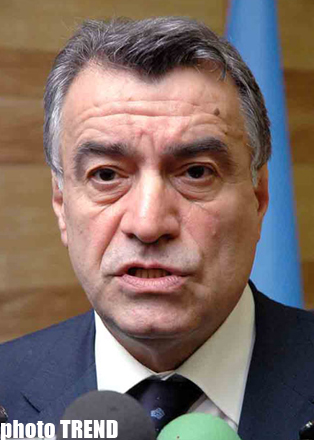Azerbaijan , Baku, May 25 / Trend /
A meeting of Economy and Energy Ministers of the countries participating in the AGRI project - Azerbaijan, Romania and Hungary, to be held in Bucharest on May 26-27, will assess the work performed. The parties also plan to study the question of the feasibility study.
"We have to determine issues related to the feasibility study. We must resolve who and how will prepare it," Azerbaijani Industry and Energy Minister Natig Aliyev told Trend on Wednesday.
He said today five private companies have claimed to develop the feasibility study.
"They have offered their services to finance preparation of the feasibility study," he said.
Earlier, there were proposals for funding the feasibility study through the participant-parties' own expense or through the involvement of the EU grant.
"But both of these proposals are highly questionable, since the appeal to the EU is a long process and then we will lose too much time. As for financing through the participant-parties' own expense, I can say that not all companies have the financial means to fund the feasibility study," Aliyev said.
He said the previous ministerial meeting discussed a third option to finance the feasibility study - through those companies that are interested in the AGRI project and future investments.
"A presentation is expected to be held at the forthcoming Bucharest meeting, following which we will evaluate the proposals of companies wishing to prepare the feasibility study," Aliyev said.
"Given that different companies once carried out some research on the gas transportation from the Caspian and Black Sea regions to Europe as a part of the various EU projects, such as INOGEIT and TACIS, I do not think that companies will require a long time to develop the feasibility study," he said.
Most likely, companies will only drill down the data needed for future capital expenditures for the project elements. "Particularly, the matter is items such as laying a new pipeline from Tbilisi to the Black Sea," he said.
While developing the feasibility study, companies should also assess the transportation costs that are necessary with a view to attract special vessels for transporting liquefied natural gas. The project envisages the construction of a gas liquefaction plant.
"All these elements of the project are known. It is necessary to study their technical and economic parameters, identify issues that need to be addressed in legal terms. They all will be reflected in the feasibility study, preparation of which, I think will take no more than a year," Aliyev said. "The issue of attracting funds needs to be resolved then."
Bucharest will also host the next meeting of the Managing Board of AGRI LNG Co.
"Following the ministerial meeting, the Board of Directors may receive some instruction on the work in this direction," he added.
SOCAR Vice-President and member of AGRI LNG Co managing team Vitaly Beylarbeyov told work on the AGRI project progresses.
"Oil and gas companies from Japan, Korea, Turkey, France and Norway show interest in the project," Beylarbeyov said.
AGRI project envisages the delivery of liquefied natural gas from Azerbaijan to Romania via the Black Sea coast of Georgia. Azerbaijan, Georgia, Romania and Hungary signed the Baku Declaration on the draft AGRI on Sept. 14 in Baku.
Azerbaijan , Georgia, Romania and Hungary signed a protocol within the implementation of the AGRI project on Feb.14 in Baku. The signed document stressed the need to support the companies participating in the project in attracting the necessary funding for the feasibility study. The paper notes that under the increased work means finding the shortest route of delivery of Azerbaijani gas to European markets, the creation of Interconnector Romania - Hungary (Arad-Szeged).
Earlier, the joint venture was registered in Romania within the AGRI project. The joint company will prepare a feasibility study of the new project and seek funding.
Participants of the project are Azerbaijani SOCAR, Oil and Gas Corporation of Georgia, the Romanian ROMGAZ and Hungarian MVM. Each has a 25 percent shareholding. In the future, Bulgaria also can join the project.
The AGRI project envisages transporting Azerbaijani gas via pipelines to the Black Sea coast of Georgia, where the gas will be liquefied at a special terminal. The gas will then be delivered to a terminal at the Romanian port of Constanta via tankers. Later, the liquefied gas will be brought into the state of natural gas and will be directed towards covering the needs of Romania and other European countries.
It is expected that Turkmenistan, by participating in the project as a supplier, could supply liquefied natural gas across the Caspian Sea to Azerbaijan for further transit to Europe .






